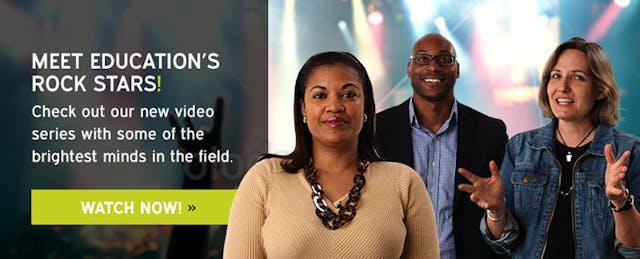Education is no longer a walled garden, especially as it seeks to leverage expertise and technology from other industries to improve the teaching and learning process. So it makes sense to bring in talent from outside the traditional pipelines to introduce new, innovative ideas to solve toughest problems facing schools and students.
That’s the underpinning behind Activate ED, a partnership launched in December 2012 between the Broad Center for the Management of School Systems, Education Pioneers, and the Strategic Data Project. The initiative is funded by grants from the Gates Foundation. (Disclosure: EdSurge has also received support from the Gates Foundation.)
“We’re trying to raise awareness around the country that the smartest people should work in education,” says Chris Rico, Activate ED’s campaign director.
Activate ED’s mission is to “transform public education by supplying top leaders, managers, and analysts to the field” via fellowship opportunities offered by the three partners. (There’s also a short quiz to help gauge which program may be the best fit.) It’s seeking to recruit 1,500 new leaders by April 2014 and place them at non-profits, school districts, CMOs, and state and federal education agencies.
To support this vision, Activate ED will release this week the first video in its ten-part “Education’s Rock Stars” series, which asks thought leaders to share what makes their work so uniquely challenging and rewarding. First up is Tom Vander Ark, founder and CEO of GettingSmart and a partner at Learn Capital. Nine others, including Matchbook Learning CEO Sajan George, Eduwonk blogger Andy Rotherham, and yes, our very own Betsy Corcoran, will be featured in the following weeks.
Each video will be accompanied by a toolkit of materials and resources chosen by each expert.
“The personal digital learning revolution is the best chance we've ever had to improve quality and extend access--both take design thinking, tech development skills, and new deployment strategies,” wrote Vander Ark via email to EdSurge. “These changes create new opportunities for learning professionals inside and outside schools.”
The need for investment in human talent, he added, may be paramount to investments in technology. One doesn’t have to look far back to heed the lessons. “Most of the last 15 million computers we bought were layered on top of a “school-as-we've-always-done-it” [approach]. When I hear about truckloads of iPads being delivered, I worry about many schools just creating a more expensive version of what we have with only slightly better results.”
Last month, Activate-ED organized a weekend hackathon, HACKtivateED, to bring together developers, educators, and all-around brainy professionals to solve real problems in the classrooms, as laid out by schools themselves. (Here's our on-the-scene report.)


